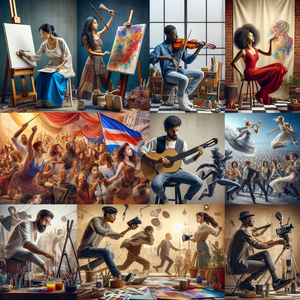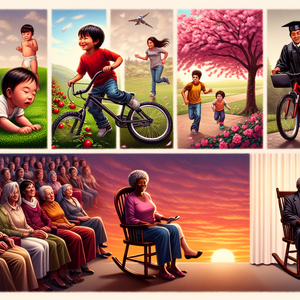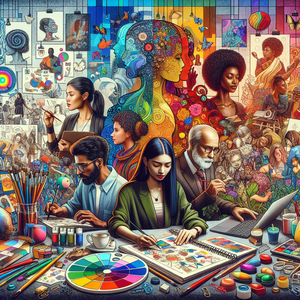
Unleashing Creativity: 20 Vibrant Careers in the Arts
The arts sector is a treasure trove of career possibilities that not only nurture personal creativity but also strengthen community bonds and promote healing. This exploration of the diverse roles within arts organizations reveals the vital connection between creativity and individual well-being, as well as societal development. From nonprofits like the H Foundation for the Arts to youth-focused initiatives such as 4-H, the range of opportunities is vast, catering to many skills and passions.
Job Summaries:
Arts Administrator:
- As an Arts Administrator, you will be the backbone of an arts organization, managing budgets, fundraising efforts, and event planning.
- By collaborating with artists and community members, you will create programs that resonate with the organization’s mission.
- Typically, a degree in arts management or a similar field is necessary, alongside strong organizational skills.
- This role is essential for sustaining creative initiatives.
Community Engagement Coordinator:
- The Community Engagement Coordinator serves as a liaison between the arts organization and the community.
- Crafting programs to encourage participation in the arts.
- This position demands excellent interpersonal skills and a passion for community service.
- Often supported by a background in social sciences or arts administration.
- By building relationships, you enhance the organization’s outreach and impact.
Teaching Artist:
- Bringing artistic skills into educational environments
- A Teaching Artist leads workshops and classes for learners of all ages
- This role requires creativity in curriculum design
- Integrating artistic practices with educational goals
- A degree in fine arts or education is typically required
- Along with teaching experience
- Your influence helps students grow and appreciate the arts
Grant Writer:
- A Grant Writer identifies funding opportunities and crafts proposals to secure financial support for arts organizations.
- This role necessitates exceptional writing skills and an understanding of the arts funding landscape.
- A bachelor’s degree in communications or a related field is often needed.
- Successful grant writers are instrumental in ensuring arts organizations have the resources to thrive.
Marketing Specialist for Arts Organizations:
- Develop and execute marketing strategies to promote arts events and programs.
- A degree in marketing or communications is usually required.
- Experience in digital marketing is important.
- Work is crucial for increasing visibility and attendance.
- Contributes to the organization’s success.
Curator:
- Curators select and organize exhibitions in galleries or museums.
- Curators draw on strong research skills and a deep understanding of art history.
- A master’s degree in art history or museum studies is often preferred.
- Curators play a pivotal role in shaping public perceptions of art.
- Curators ensure diverse voices are represented.
Arts Program Director:
- Oversee the development and execution of artistic programming.
- Requires a background in arts administration or management.
- Strong leadership abilities are essential.
- Vital for enhancing cultural offerings.
- Addresses community needs.
Art Therapist:
- Art Therapists utilize creative processes to help individuals express themselves and navigate emotional challenges.
- This specialized role typically requires a master’s degree in art therapy and relevant certification.
- By leading therapeutic art experiences, you significantly contribute to mental health and well-being.
Development Director:
- Focused on fundraising
- Creates strategies
- Manages donor relationships
- Organizes events for arts organizations
- A bachelor’s degree in nonprofit management or a related field is usually necessary
- This position is critical for the financial health of arts organizations.
Exhibition Designer:
- As an Exhibition Designer, you create captivating spaces for displaying artworks.
- Requiring knowledge of design principles.
- A degree in design or architecture is typically needed.
- Your work enhances public engagement with art.
Cultural Program Coordinator:
- Developing programs that celebrate cultural diversity through the arts.
- Strong project management skills are essential.
- A passion for cultural engagement is essential.
- A degree in cultural studies or arts administration is often required.
- Enriching community experiences.
Visual Arts Educator:
- Teaching various artistic techniques in schools or community programs
- Plays a significant role in fostering student creativity
- Requires a teaching credential
- Requires a background in fine arts
Digital Content Creator for Arts Organizations:
- A Digital Content Creator produces engaging online materials to promote arts initiatives.
- Strong digital skills and a background in communications are essential.
- Your work helps organizations reach broader audiences effectively.
Artistic Director:
- Responsible for the overall vision of an organization
- Shapes artistic programming
- This high-level role requires extensive experience in the arts
- Requires strong leadership skills
- Influences the organization’s identity
- Affects community impact
Production Manager:
- Overseeing the logistics of performances or exhibitions
- The Production Manager ensures everything runs smoothly
- A degree in theater production or a related field is typically necessary.
Social Media Manager for Arts Organizations:
- This role involves managing an arts organization’s social media.
- Creating content.
- Engaging with followers.
- A background in marketing or communications is beneficial for enhancing outreach efforts.
Art Historian:
- Art Historians conduct research and analysis of artworks.
- They contribute to publications and exhibitions.
- A master’s or Ph.D. in art history is typically required.
- They preserve and interpret cultural heritage.
Performing Arts Coordinator:
- This position manages events related to theater, music, and dance.
- Requires strong organizational skills.
- Requires event planning experience.
Graphic Designer for Arts Organizations:
- Creating visual content for marketing materials and social media
- Plays a key role in communicating the organization’s mission
- A degree in graphic design is typically required
Arts Policy Analyst:
- Arts Policy Analysts research and evaluate policies affecting the arts sector.
- They provide insights that influence funding and support mechanisms.
- A degree in public policy or arts administration is often needed.
These roles offer unique opportunities to contribute to creativity and community engagement. For those interested in pursuing a career in the arts, exploring current job openings is a fantastic first step. By understanding the qualifications and responsibilities associated with each position, you can embark on a fulfilling journey in this dynamic field, positively impacting both the arts community and broader society.
Explore More Jobs

